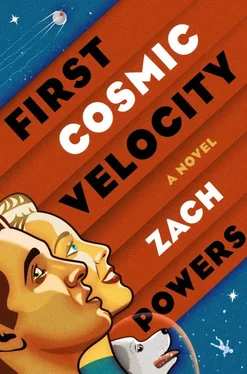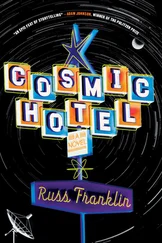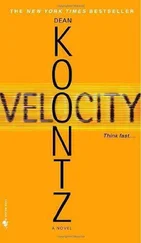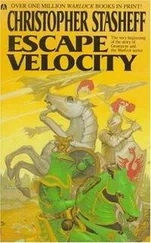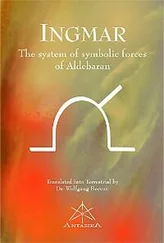Leonid dug his toe into the bed of brown needles at the edge of the woods. “I’m here in my home, and I can tell you for sure that there’s nothing special about returning.”
“Don’t lie to me, Leonid, and don’t lie to yourself. I saw your face as you first saw this cottage.”
“We’re all liars. We’ve been trained to lie since the day Tsiolkovski claimed us.”
She held out her hand to Leonid.
“You may not like my decision, the risks I will take, but I promise you this: I will never tell you anything but the truth.”
Leonid searched her face. For the first time he saw something of Nadya’s sister there. The physical features, of course, had always been the same, but now some of the other Nadya’s warmth was there, as well. This was the face of the girl who had held and rocked him when he woke in tears those first weeks in Star City. The loss of this face was what he had grieved. If it could return now, years after he thought it gone forever, then it seemed possible that his brother could still return, as well. It seemed possible that if he climbed onto the roof of Grandmother’s cottage, he could see his brother coursing among the stars.
Leonid took Nadya’s hand.
“I believe you,” he said.
It had only been a matter of days since Leonid made his escape, since he claimed domain over his own life, and he was already ceding it back to someone else. But no, he realized that he had always thought of his plan as Nadya’s escape. Though he had chosen the destinations, he had gone as much for her as for himself. Nadya was the one who everyone followed. Every cosmonaut and engineer. Every Soviet citizen. The whole world. The future lay where she led it.
Nadya pulled Leonid toward the door. He entered Grandmother’s cottage for what he knew would be the final time.
Grandmother and Mykola stood in the cottage doorway long after the sound of the train had faded from the valley. Now it seemed the quietest place imaginable, as if the very air had departed, as well. Grandmother turned her attention to the boy beside her, not her grandsons, but all that was left of them.
“You’re always welcome here,” she said.
“Will you be all right?” asked Mykola.
She shifted in place, her worn shoes rasping on the wooden floor.
“Have I ever told you the story of the man who our village is named after? Bohdan Zinoviy Mykhaylovych Khmelnytsky commanded hundreds of men in service to the Polish crown. At this time, the Cossacks were considered inferior forces, used only by Polish generals for menial tasks or as fodder for first charges in battle. Khmelnytsky’s small force, however, earned a reputation for ferocity and for turning defeat into victory. At the sight of his flag on the battlefield, the Ottoman forces would retreat before a single arrow was launched. It’s no exaggeration to say that the Polish empire lasted as long as it did because of Khmelnytsky. It’s ironic then that he also factored into its collapse.
“A hero returning from war expects to be treated as such, but before he arrived back at his home in Subotiv, Khmelnytsky could tell by the black columns of smoke that something was amiss. He could not, however, have predicted the tragedy that awaited him. His home and the outlying buildings of his estate moldered from recent fires. Livestock lay slaughtered in his fields. Beside the first cottage he came to, where one of his cousins lived, he mistook for a pile of dirt the heaped bodies of his kin. At the apex of the pile, like the snow that once capped the mountains surrounding our valley, was Khmelnytsky’s eldest son, beaten so badly that Khmelnytsky could only recognize him by the clothes he wore, a shirt that had once belonged to Khmelnytsky himself. Only a few flies had found the bodies. He rooted through the pile, familiar faces made strange by rigor. His other children were not among them. Nor his wife.
“From across the field ran several figures, and he recognized his daughter at the forefront. She wore only her nightclothes, barefoot. The others with her, his other sons and a few of his younger cousins, were also disheveled, but all seemed healthy. He searched among their faces for his wife, but she was not with them, either.
“He hugged his children tight to his chest even as he ordered his attendant to reassemble his soldiers. Could the Ottomans have struck at him in his own home? But no, they were too far away. This was not revenge. He couldn’t fathom then what it might be. His daughter—Khmelnytsky would always remember that her eyes were dry, and he would always try to live up to her strength—said that the soldiers who came spoke Polish. She pointed in the direction they had fled.
“Khmelnytsky didn’t wait for any of his own soldiers to join him. He mounted his horse and tore across the countryside until he found the tracks left by the men who had killed his son, a sizable force judging by the utter muck made of the trail by their progress. The forest thickened, the trail narrowed, but Khmelnytsky urged the horse on even as branches whipped at mount and rider both. Blood dripped from gashes on Khmelnytsky’s cheeks and arms.
“Entering a clearing, he espied another column of smoke. Around it were several tents and a contingent of men and horses, maybe thirty of each. As he neared, he spotted one figure hunched among the tall, gloating Poles. It was his wife, sitting by the fire, leaning into its warmth as if to throw herself to the flames. Khmelnytsky made no attempt to conceal himself, driving down on the encampment full gallop. It took the Poles too long to notice him and far too long to react. Before the sentry had unsheathed his sword Khmelnytsky’s blade removed the man’s arm. The soldiers, sitting around the fire or dozing against the trunks of trees fell in quick succession. Khmelnytsky’s horse kicked up a cloud of dust that hid him as if in the black mists of hell, scattering the logs of the fire and launching sparking embers on high arcs through the sky. The nearest tent ignited.
“Khmelnytsky dismounted and placed his horse between his wife, whose hands and feet were bound, and the soldiers streaming from their tents. The blood from the scratches on Khmelnytsky’s face had crusted into red-brown stains in his beard. He seethed, hulking in heaving breaths, his muscles bulged by the rage that consumed him. One of the Poles advanced. Khmelnytsky slashed with his sword, and the Pole tried to parry but the blow was so strong that the sword fell from his hands. Before he could think to stoop and retrieve it, Khmelnytsky delivered the fatal blow. Two more soldiers fell as quickly as the first. The rest turned to flee, the demon before them so terrifying, something born of the leaping flames.
“But turning their backs was a mistake. They could offer no defense to the barrage of slashes that befell them. They all died as cowards, asses to their fears, faces planted in the black dirt.”
“I’m not sure I like this story,” said Mykola.
“You know,” said Grandmother, “I never told the twins the whole story of Khmelnytsky’s life. I always stopped here. The real darkness comes after. But I like this ending, with Khmelnytsky returning home. Sad, yes, but also triumphant. He had a home worth defending and found a way to defend it. That’s why I was willing to let the twins leave. This cottage, the village, the valley—none of that will be the home they one day return to in triumph. Even if they do return to the valley, somewhere else will be their true home, other people their true family. One can’t have two homes. One can’t be leaving home and heading toward it both at the same time.”
“Will you miss them?”
“Won’t you?”
Читать дальше
